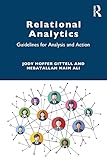Relational analytics : guidelines for analysis and action / Jody Hoffer Gittell, Hebatallah Naim Ali.
Material type: TextPublication details: New York: Routledge, 2021.Description: 190 pagesISBN:
TextPublication details: New York: Routledge, 2021.Description: 190 pagesISBN: - 9780367436254
- 302.3 GIT
| Item type | Current library | Home library | Call number | Status | Date due | Barcode | |
|---|---|---|---|---|---|---|---|
 Book
Book
|
Institute of Management Processing Center | Institute of Management | 302.3 GIT (Browse shelf(Opens below)) | Available | IMK16742 |
Includes bibliographical references and index.
From People Analytics to Relational Analytics -- The Theory of Relational Coordination -- Evidence About the Outcomes and Predictors of Relational Coordination -- Choosing a Research/Evaluation Design to Answer Your Questions -- Measuring Relational Coordination -- Constructing Relational Coordination Variables -- Visualizing and Analyzing Relational Coordination with Matrices and Networks -- Measuring the Organizational Structures that Shape Relational Coordination -- Analyzing the Outcomes and Predictors of Relational Coordination -- Leveraging Relational Analytics to Create Positive Change -- Moving Forward with Research and Action.
"This guidebook goes beyond people analytics to provide a research-based, practice-tested methodology for doing relational analytics, based on the science of relational coordination. We are witnessing a revolution in people analytics, where data are used to identify and leverage human talent to drive performance outcomes. Today's workplace is interdependent, and individuals drive performance through networks that span department, organization and sector boundaries. This book shares the relational coordination framework, a validated scalable analytic tool which has been used successfully across dozens of countries and industries to understand, measure and influence networks of relationships in organizations, and which can be applied at any level in the private and public sectors worldwide. Graduate students and practitioners in human resource management, organizational behavior, engineering, and network analysis will appreciate the methodology and hands-on guidance this book provides, with its focus on identifying and building networks of talent. Online resources include data appendices and statistical commands that can be used to conduct all these analyses in readers' own organizations"--
There are no comments on this title.

